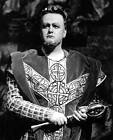ORFEO International
News
June 2012
Franz Crass † 23 June 2012
Franz Crass
Franz Crass as König Heinrich (Bayreuth 1959/62)
Foto: Archive of Bayreuther Festspiele was an exception among German basses of the post-war period. His singing was typified by its balm-like mellifluousness, seamless legato and the radiant top notes for which many of his baritone colleagues must have envied him. But he resisted the temptation to change to the heroic baritone repertory following his Bayreuth role début as Wagner’s Flying Dutchman, a role he took on at the suggestion of the composer’s grandson, Wieland. None the less, he occasionally ventured into this repertory in the recording studio, notably in excerpts from the roles of the four villains in Offenbach’s Les contes d’Hoffmann and as Jupiter in Strauss’s Die Liebe der Danae, which he sang with the top notes restored for the first time to their original pitch. No less unforgettable than Franz Crass’s appearances in the opera houses of the world were his performances in its concert halls, which were invariably of the same high standard. Among his recordings for Orfeo are Haydn’s The Seasons under the direction of Rafael Kubelík (C 477 982 I). He was luxury casting as the Hermit in Weber’s Der Freischütz, with which he bade farewell to the stage in Frankfurt in 1980 – a sadly premature retirement necessitated by a hearing disorder. On the Orfeo label he can be heard in the same part at the first night of a new production at the Vienna State Opera that was recorded eight years earlier under Karl Böhm (C 732 072 I). From the time of his close working relationship with Wieland Wagner comes a live recording from Bayreuth, a 1959 Lohengrin under Lovro von Matacic in a performance distinguished by Franz Crass’s portrayal of an unusually young King Heinrich (C 691 063 D). This, too, is an object lesson in an Italianate approach to Wagner singing. As a result, it comes as no surprise to discover that Franz Crass also enjoyed great success as Procida in Verdi’s I vespri siciliani and as Fiesco in Simon Boccanegra, especially at the Bavarian State Opera. But he also appeared all over the world: from Salzburg to Buenos Aires and Tokyo his appearances and recordings are still gratefully remembered by all lovers of classical singing.

Die Jahreszeiten, ORFEO CD C 477 982 I 
Der Freischütz, ORFEO CD C 732 072 I 
Lohengrin, ORFEO CD C 691 063 D
top |